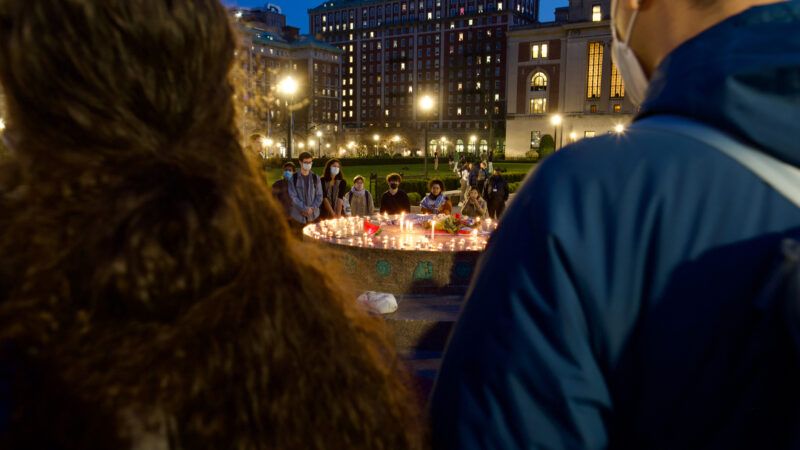Court Frees Palestinian Student Arrested by ICE at His U.S. Citizenship Hearing
A U.S. district judge called Mohsen Mahdawi’s detention a “great harm to a person who has been charged with no crime.”

The arrest of Mohsen Mahdawi was a test of just how far President Donald Trump's power over immigrants could go. Mahdawi, a ten-year legal U.S. resident and a student at Columbia University, was at his interview to become a U.S. citizen earlier this month. But because he wasn't a citizen yet, the Trump administration argued that it could deport Mahdawi for his protest activity, and had Immigration and Customs Enforcement (ICE) agents pick him up at the immigration center.
On Wednesday, however, a federal judge ordered ICE to free Mahdawi, who was born in a refugee camp in the Palestinian territories, while his case proceeded. "The two weeks of detention so far demonstrate great harm to a person who has been charged with no crime," U.S. District Judge Geoffrey Crawford said at the hearing, according to ABC News. "Mr. Mahdawi, I will order you released."
Although he didn't rule directly on Mahdawi's case, Crawford said that Mahdawi was likely to succeed on the merits, and that keeping him locked up would "likely have a chilling effect" on the First Amendment.
"The court also considers the extraordinary setting of this case and others like it. Legal residents—not charged with crimes or misconduct—are being arrested and threatened with deportation for stating their views on the political issues of the day," he wrote in his ruling.
In a speech outside the courthouse, Mahdawi struck a patriotic tone. "For anybody who is doubting justice, this is a light of hope and faith in the justice system in America," he said. "To President Trump and his cabinet: I am not afraid of you," he added. The court order doesn't stop the deportation, but allows Mahdawi to walk free while his case is ongoing, reports Politico.
"I have showed my will, my desire to become an American in a place that I call home in Vermont," Mahdawi had told NPR from his cell. "And the American government has denied me this opportunity by setting me up, actually deceiving me. So now it's up to the American people to decide what path they would want to take, whether to have the path where they welcome me as a citizen of this country or not."
The administration had argued in court that Mahdawi's very presence in America "would have serious adverse foreign policy consequences and would compromise a compelling U.S. foreign policy interest" because campus protests could "potentially undermine the peace process underway in the Middle East."
It was an ironic accusation to level against Mahdawi specifically. Although his family had a history of armed rebellion against Israel—and he himself had witnessed killings and was shot in the leg by an Israeli soldier at age 15—Mahdawi had gotten into Buddhism and dialogue with Israeli peace activists during his time in America. He called himself "pro-peace and antiwar" in his courthouse speech.
The Trump administration is still holding at least two other foreign students over pro-Palestinian campus activities. Mahmoud Khalil, the first student to be detained as part of this campaign, cofounded the Palestinian Student Union at Columbia with Mahdawi. He missed the birth of his American son last week. Rümeysa Öztürk, a Turkish doctoral student at Tufts University who simply wrote a school newspaper editorial calling to divest from Israeli companies, has a court hearing scheduled for May 6.
The administration is also trying to deport Badar Khan Suri, an Indian postdoctoral fellow at Georgetown University. The Department of Homeland Security alleged that he has "close connections" to Hamas because his wife is the daughter of a deputy cabinet official in the Hamas-run government of Gaza, and that he was "promoting antisemitism on social media."
Secretary of State Marco Rubio has argued that the administration doesn't have a high burden to prove its case. "No one has a right to a student visa. No one has a right to a green card, by the way. So when you apply for a student visa or any visa to enter the United States, we have a right to deny you for virtually any reason," he told journalists last month.
While he conceded that the government has very broad immigration powers, Crawford strongly disagreed that those powers were unlimited.
"Noncitizen residents like Mr. Mahdawi enjoy First Amendment rights in this country to the same extent as United States Citizens," he emphasized. "If the Government detained Mr. Mahdawi as punishment for his speech, that purpose is not legitimate, regardless of any alleged First Amendment violation. Immigration detention cannot be motivated by a punitive purpose. Nor can it be motivated by the desire to deter others from speaking."


Show Comments (47)